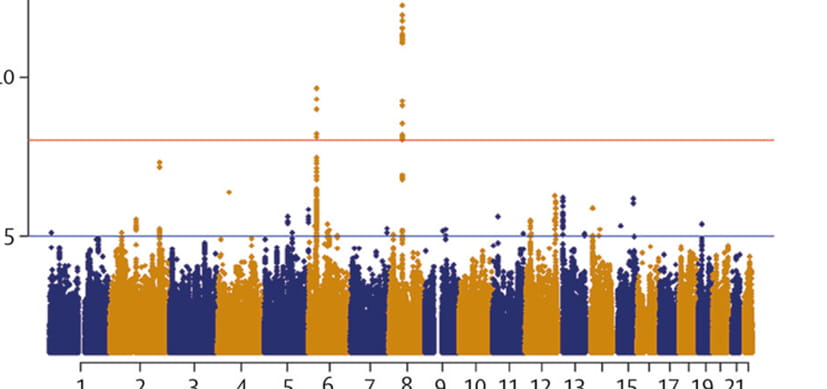
William C. Nichols, PhD
- Associate Director of Research, Division of Human Genetics
- Director, National Biological Sample and data Repository for PAH
- Professor, UC Department of Pediatrics
About
Biography
My primary research focuses on genetic susceptibility to pulmonary hypertension involving both rare and common genetic variation. My colleagues and I utilize both patient and animal model samples to identify variation in the human genome that leads to susceptibility for this rare, destructive and often fatal condition. In addition, I am studying the genetic susceptibility to Parkinson’s disease as a secondary concentration.
The objectives of my lab team and I involve using genetic methods among diseases to bring about patient-specific customized therapies based on genetic variations that different patients may be harboring. We also hope our genetic approaches to studying disease may lead to innovative treatments based on new pathways we find in our research.
Throughout my career, I’ve had the chance to discover multiple novel disease genes, such as familial amyloidotic polyneuropathy, two different genes for combined factors V and VIII deficiency, thrombotic thrombocytopenic purpura, spheroid body myopathy and numerous novel susceptibility genes for pulmonary arterial hypertension.
I have participated in multiple seminal discoveries for genetic susceptibility to Parkinson’s disease. I developed the world’s largest biorepository of clinical information, biological samples and genetic data for patients with pulmonary arterial hypertension. This biorepository is known as the National Biological Sample and Data Repository for Pulmonary Arterial Hypertension (PAH Biobank).
The National Institutes of Health (NIH) and the National Heart, Lung, and Blood Institute (NHLBI) funded this resource for the PAH research community. The biorepository has led to pioneering research focused on biomarkers, genetics and metabolomics in patients with PAH.
I have more than 30 years of experience in genetics and first joined the Cincinnati Children’s team in 1998. My research has been published in numerous respected journals, such as American Journal of Respiratory and Critical Care Medicine, The Lancet Respiratory Medicine, Circulation, Cell, Nature Genetics, and Nature Communications.
PhD: Department of Medical Genetics, Indiana University, Indianapolis, IN, 1989,
Fellowship: Department of Internal Medicine, University of Michigan, Ann Arbor, MI, 1992,
Services and Specialties
Interests
Dr. Nichols investigates the genetic susceptibility of pulmonary arterial hypertension. His lab was instrumental in identifying the first gene associated with the disorder. He is director of the NHLBI funded National Biological Sample and Data Repository for PAH, an effort to bank biological samples, clinical and genetic data for 3,000 PAH patients. Genetic analysis of murine pulmonary hypertension and Parkinson disease are also ongoing research interests.
Research Areas
Publications
Germline and somatic variants in DNMT3A and other clonal haematopoiesis of indeterminate potential genes contribute to pulmonary arterial hypertension. European Heart Journal. 2025.
Association of FOXF1 Genomic Variants With Children and Adults With Pulmonary Arterial Hypertension. American Journal of Respiratory and Critical Care Medicine. 2025; 211(Supplement_1):a3275-a3275.
Comparative Metabolomic and Molecular Profiles in Methamphetamine-associated and Idiopathic Pulmonary Arterial Hypertension. American Journal of Respiratory and Critical Care Medicine. 2025; 211(Abstracts):a7248-a7248.
Sex-specific Differences in Eicosanoid and Bioactive Lipid Metabolites and Their Associations With Hemodynamic Parameters in Pulmonary Arterial Hypertension. American Journal of Respiratory and Critical Care Medicine. 2025; 211(Abstracts):a7247-a7247.
Cellular Communication Network Protein 2 in the Right Ventricle of Pulmonary Arterial Hypertension. Pulmonary Circulation. 2025; 15(2):e70067.
Tet Methylcytosine Dioxygenase 2 (TET2) Mutation Drives a Global Hypermethylation Signature in Patients With Pulmonary Arterial Hypertension (PAH): Correlation With Altered Gene Expression Relevant to a Common T Cell Phenotype. Comprehensive Physiology. 2025; 15(2):e70011.
Lysosomal dysfunction and inflammatory sterol metabolism in pulmonary arterial hypertension. Science. 2025; 387(6732):eadn7277.
Equivalency of Multiple Biomarkers to Clinical Pulmonary Arterial Hypertension Survival Risk Models. Chest. 2024; 166(6):1511-1531.
Utility of factor D and other alternative complement factors as biomarkers in systemic sclerosis-associated pulmonary arterial hypertension (SSc-PAH). Seminars in Arthritis and Rheumatism. 2024; 69:152554.
Abstract 4140468: Tet Methylcytosine Dioxygenase 2 mutation drives a global hypermethylation signature in patients with pulmonary arterial hypertension resulting in a common T cell phenotype. Circulation. 2024; 150(Suppl_1):a4140468-a4140468.
From the Blog
Common Genetic Variant Found for Pulmonary Arterial Hypertension
William C. Nichols, PhD6/30/2019




